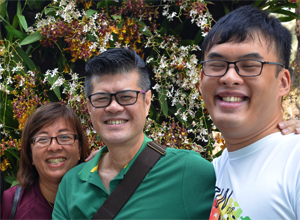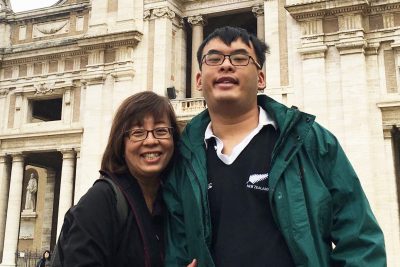Young Children’s Voices in Mathematical Problem Solving
Contributed by Dr Ho Siew Yin and Sng Wei Qin Abbie, from NTUC First Campus, for SingTeach Virtual […]
Read More
It is every parent’s hope that their children grow up healthy and well-integrated into society – parents of children with special needs are no exception. Having experienced the challenges of raising a child with special needs in Singapore, Magdelene hopes her story will increase awareness of their needs and encourage parents, teachers and caregivers to soldier on and build a more caring and inclusive society.

(from left) Magdelene, her husband and son Sebastian
Sebastian is my eldest boy. He is 26 this year. When he was in preschool, his teacher used to say, “Sebastian seems to learn something, but a while later he forgets and he acts as if he never learnt it before.” They advised me to send him for a brain scan, which I did. That’s when I found out he was born without a corpus callosum. We could not pinpoint the exact problem, but his is an intellectual disability diagnosed as Global Developmental Delay.
As a typical Singaporean parent with high expectations of my children, it was initially hard to accept Sebastian’s condition. Even after I realized I needed to get over my denial and find out what I could do for him, I was groping in the dark due to a lack of resources.
Sebastian’s developmental milestones were delayed, so when it was time for him to enter primary school, he was not ready. Mainstream primary schools I approached also lacked the necessary support to accept him.
It was fortunate that he eventually went to Dover Court Preparatory School, an international school that ran a special needs class alongside mainstream classes.
During his 4 years there, he was included in mainstream school activities; he acted in school dramas and participated in sports and school concerts. Since he was in a small class, he had all the attention he needed. Enrolling him there is probably one of the best things I’ve done for him.
After Dover Court, we registered him with one of MINDS’ (Movement for the Intellectually Disabled of Singapore) Special Education schools. The real challenge began when he graduated from MINDS at 18. As the queue to enter one of MINDS employment development centres was really long, I had to search for other things for him to do.
His focus and motor skills were not good enough for him to experience open employment, so he went to a sheltered workshop, Touch Centre for Independent Living (TCIL), where he learnt basic life skills like how to clean himself and travel on his own. He spent a couple of years there in a school-like environment.
After a few years, I felt he needed to understand that he needs to work, so I sent him to Thye Hua Kwan Pan-Disability Centre where he does simple work like putting together Singapore Airlines luggage tags.
Work is important to keep him engaged. The moment those with special needs stay at home and stop engaging with the outside world is when they regress. Many of them develop mental issues because they are like any other human being – they need to be wanted and to have friends.
Having said that, Sebastian benefits a lot more now from the inclusive activities that we have in society. Besides his work, he is involved in other activities such as Runninghour every Saturday. Regular runners run alongside people with disabilities, mainly the blind and intellectually challenged. He is also with Special Olympics Singapore and bowls every Tuesday with his friends with special needs. These are valuable opportunities for him to mingle, make friends and achieve something.
“Sebastian benefits a lot more now from the inclusive activities that we have in society… these are valuable opportunities for him to mingle, make friends and achieve something.”
– Magdelene Yip, on the positive impact that inclusive activities have on her son Sebastian, an individual with special needs
My greatest fear is what will happen to him when I am no longer around. I know his siblings will care for him, but more needs to be done to support adults and elders with special needs.
Working is definitely also a big challenge for adults with special needs because not many work environments can cope with them. This is not because employers are not compassionate, but because the demands of their work makes it difficult.
Those who are high-functioning can often find jobs in the service industry, but dealing with customers can be difficult for those like Sebastian who struggle with reading subtle social cues. They fare better in controlled environments like the sheltered workshop, but there is limited space.
There is also a need for more day activity centres for those who cannot work at all.

Magdelene shares with us how we can build a more caring and inclusive society for individuals like her son Sebastian, a person with special needs.
I think we are generally more receptive. MOE is trying to educate those with special needs, and many workplaces are a lot more accommodating, sometimes changing their workflow for them. Government wage subsidies are also helpful in encouraging companies to hire workers with special needs.
It is only when people with special needs misbehave or have meltdowns that the public gets scared because they don’t know what to do. I don’t blame them. With more exposure, I believe people will become more accepting.
One natural way to nurture social cohesion is by starting young. I hope that we will have more schools where special needs classes run alongside mainstream classes, where those with special needs get to do sports and eat in the same canteen as the rest of the children. Being in the same environment is very helpful in getting the other children to understand their unique conditions.
Just think, if one grows up having dealt with people with special needs in school, wouldn’t it become natural to eventually employ them because you understand and can accommodate them?
“Another thing you need is a sense of humour. Most of us parents have developed that, and we laugh, not at, but with our children.”
– Magdelene, on how she helps herself to cope during stressful moments
Parents, don’t be afraid to ask for help and love your child like any other child. It is important to expose them to the world and give them opportunities so that they are accepted and can find a community and life of their own. I’m still struggling to understand what Sebastian’s mission in life is, but I’m sure he has a reason for living. We must believe that just as we believe in the rest of our children. This gives us hope to carry on despite the difficulties.
Another thing you need is a sense of humour. Most of us parents have developed that, and we laugh, not at, but with our children. It helps with seeing their challenges in a less negative light. If I get stressed or embarrassed every time Sebastian acts up it will be very tough. They also get very frustrated when they are not accepted. Emotionally, physiologically, they are like anybody else. They just have a difficulty we need to understand.
As for those who work with them, try not to work with the mind-set that you are here to do things for them. Yes, they do need you to do many things for them, but don’t come with the thinking that you are here just to do things for them. Just be with them. Building that friendship and bond will help a lot more than doing things for them.